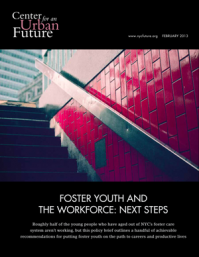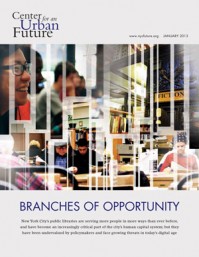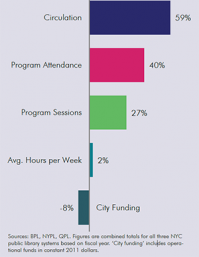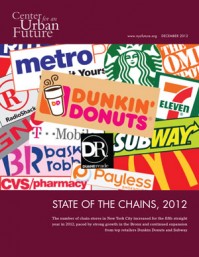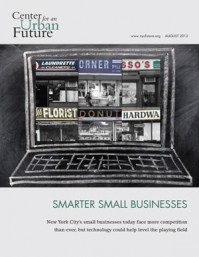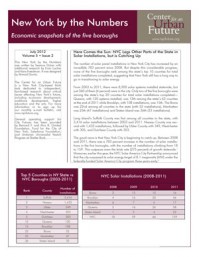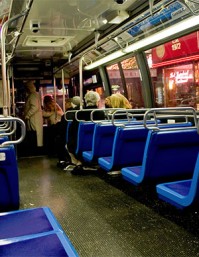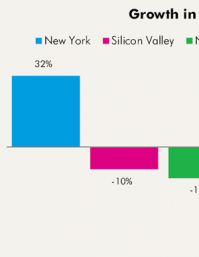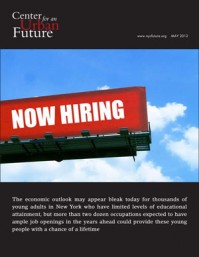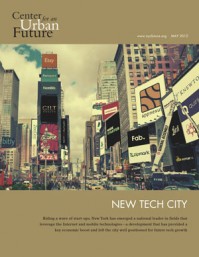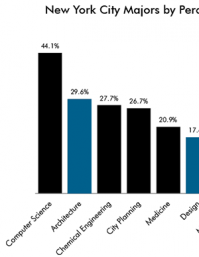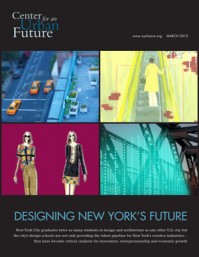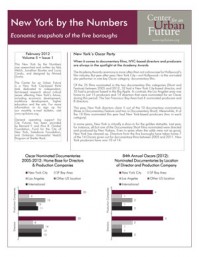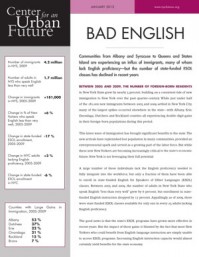Data - February 2013
Texas Two StepThere has been a huge spike in the number of New Yorkers relocating to Texas in recent years, even at a time when fewer city residents were departing for Charlotte, Atlanta, Philadelphia and other traditional destinations.
Commentary/Op-Ed - February 2013
Foster Youth and the Workforce: Next StepsRoughly half of the young people who have aged out of NYC’s foster care system aren’t working, but this policy brief outlines a handful of achievable recommendations for putting foster youth on the path to careers and productive lives.
Commentary/Op-Ed - February 2013
Time to Revamp NYC’s Workforce Development SystemNYC’s next mayor will inherit a workforce development system in far better shape than when Mayor Bloomberg took office, but it’s now time to go beyond simply placing New Yorkers into jobs and build the skills of the local workforce.
Report - January 2013
Branches of OpportunityNew York City’s public libraries are serving more people in more ways than ever before, and have become an increasingly critical part of the city’s human capital system; but they have been undervalued by policymakers and face growing threats in today’s digital age.
Data - January 2013
Data from Branches of OpportunitySelected charts and graphs from the Center for an Urban Future's major January 2013 report on NYC's public libraries. The report found that public libraries are serving more people in more ways than ever before, and have become an increasingly critical part of the city’s human capital system; but they have been undervalued by policymakers and face growing threats in today’s digital age.
Report - December 2012
State of the Chains, 2012Our fifth annual ranking of national retailers in NYC shows that the number of chain stores in New York City increased for the fifth straight year in 2012, paced by strong growth in the Bronx and continued expansion from top retailers Dunkin Donuts and Subway.
Data - August 2012
Data from Smarter Small BusinessesSelected charts and graphs from the Center for an Urban Future's August 2012 report on technology use among NYC's small businesses. The report found that far too many of NYC's small businesses still aren't using websites, online ads and other technology tools, a huge missed opportunity at a time when small firms face increasing competition from national chains and online companies.
Report - August 2012
Smarter Small BusinessesThis report finds that far too many of NYCs small businesses still arent using websites, online ads and other technology tools, a huge missed opportunity at a time when small firms face increasing competition from national chains and online companies.
Report - July 2012
Here Comes the SunThis edition of New York by the Numbers reveals that New York City lags behind the rest of the state when it comes to installing solar energy panels in residential, commercial and government buildings, but is beginning to catch up.
Commentary/Op-Ed - July 2012
GED® change will be costly for N.Y.In July 2012, the Albany Times Union published an op-ed by our senior fellow Tom Hilliard which notes that beginning in 2014 the GED® exam will cost twice as much to take and be significantly more difficult to pass, changes that will almost certainly lead to significantly fewer New Yorkers getting their GED® credential. Already, New York is 49th out of 50 states in the GED® pass rates. In the op-ed, Tom urges New York State education officials and legislators to explore alternatives to the GED® test.
Testimony - June 2012
Keeping Up with the BoroughsThe New York City Council held a hearing that was prompted by the Center for an Urban Future's 2011 "Behind the Curb" report, which documented that New York City's public transit service has not kept pace with recent job growth and transit ridership gains in the Bronx, Brooklyn, Queens and Staten Island. The Center commended the Council's Transportation Committee for convening the hearing, which is titled "Keeping Up with the Boroughs—Addressing Public Transit Needs Outside Manhattan."
Data - May 2012
Data from New Tech CitySelected charts and graphs from the Center for an Urban Future's major May 2012 report on NYC's tech sector. The report found that, riding a wave of start-ups, New York has emerged as a national leader in fields that leverage the Internet and mobile technologies—a development that has provided a key economic boost and left the city well positioned for future tech growth.
Report - May 2012
Now HiringWhile young adults without a college degree are among those who are having the hardest time finding decent paying jobs today, this report provides a ray of hope. It identifies more than two dozen occupations in New York City that are expected to have ample job openings in the years ahead which pay decent salaries and which are accessible to young adults with low levels of educational attainment.
Report - May 2012
New Tech CityRiding a wave of start-ups, New York has emerged as a national leader in fields that leverage the Internet and mobile technologies—a development that has provided a key economic boost and left the city well positioned for future tech growth
Testimony - April 2012
The Economic Impact of NYC’s LibrariesAt a City Council hearing on the city's proposed $100 million budget cut to public libraries, CUF's David Giles testified on the growing importance of branch libraries as community centers. At a time when the city faces enormous human capital challenges, more and more New Yorkers depend on the public libraries for job information, resume writing help, adult literacy, English language classes and other key services.
Data - March 2012
Data from Designing New York’s FutureSelected charts and graphs from the Center for an Urban Future's March 2012 report on NYC's design schools. The report found that New York City graduates twice as many students in design and architecture as any other U.S. city, but the city's design schools are not only providing the talent pipeline for New York's creative industries—they have become critical catalysts for innovation, entrepreneurship and economic growth.
Report - March 2012
Designing New York’s FutureNew York City graduates twice as many students in design and architecture as any other U.S. city, but the city's design schools are not only providing the talent pipeline for New York's creative industries—they have become critical catalysts for innovation, entrepreneurship and economic growth.
Report - February 2012
New York’s Oscar PartyThis edition of New York by the Numbers reveals that when it comes to documentary films, NYC-based directors and producers are always in the spotlight at the Academy Awards.
Data - January 2012
Data from Bad EnglishSelected charts and graphs from the Center for an Urban Future's January 2012 policy brief which found that communities from Albany and Syracuse to Queens and Staten Island are experiencing an influx of immigrants, many of whom lack English proficiency—but the number of state-funded ESOL classes has declined in recent years.
Report - January 2012
Bad EnglishCommunities from Albany and Syracuse to Queens and Staten Island are experiencing an influx of immigrants, many of whom lack English proficiency—but the number of state-funded ESOL classes has declined in recent years.


